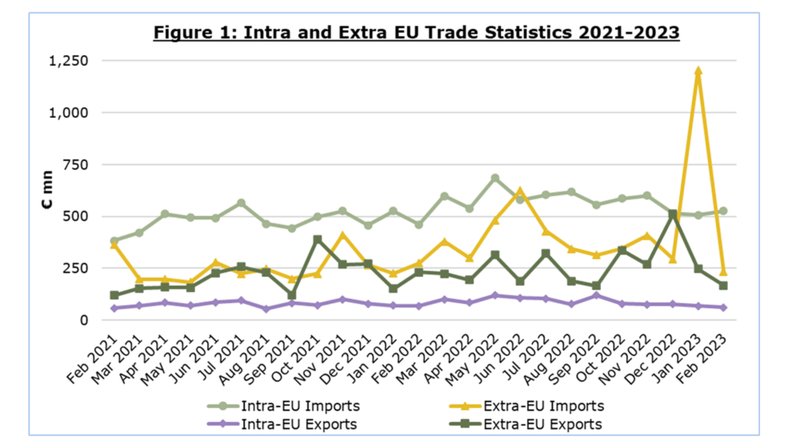Cyprus recorded highest ever trade deficit in January-February
11:00 - 21 April 2023

Cyprus recorded its highest ever trade deficit in January-February 2023, with Cystat figures showing that it increased by almost €1b compared with the same period last year. This was attributed to a staggering 127% increase in imports.
Total imports of goods amounted to €1,712.3m in January 2023 as compared to €751.2m in January 2022, recording an increase of 127.9%.
Exports of domestically produced products, including stores and provisions, in January 2023 were €140.1m as compared to €101.3m in January 2022, recording an increase of 38.3%. Domestic exports of industrial products in January 2023 were €132.0m compared to €93.5m in January 2022, whilst domestic exports of agricultural products in January 2023 were €7.3m compared to €6.7m in January 2022.
Exports of foreign products, including stores and provisions, in January 2023 were €175.5m as compared to €121.1m in January 2022, recording an increase of 44.9%.

When it comes to the island’s exports, fossil fuels and oils took the lion’s share with 35% of total exports (or €50,276,000), followed by medicines with 19.09% (€26,705,000) and the traditional local cheese halloumi with 16.20% (or €22,661,000).
Then comes waste and scrap from paper, glass and metal, while the fifth most popular export product is potatoes.
Below are the 10 most exported locally-produced products to the EU and third countries, according to Cystat:
1) Fossil fuels and oils: 35% (€50,276,000)
2) Pharmaceutical products: 19.09% (€26,705,000)
3) Halloumi: 16.20% (€22,661,000)
4) Waste and scrap from paper, glass and metal: 4.87% (€6,806,000)
5) Potatoes: 2.48% (€3,473,000)
6) Fruit and vegetable juices: 2.30% (€3,216,000)
7) Fish (live, fresh, frozen): 1.60% (€2,237,000)
8) Fire extinguishers and spare parts and other products for electrical control and distribution: 1.35% (€1,892,000)
9) Pipes and other plastics: 1.14% (€1,596,000)
10) Citrus fruits: 0.96% (€1,349,000)


